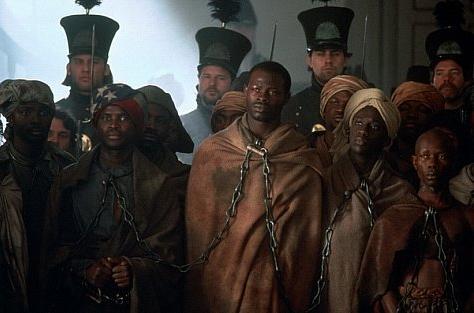
 |
| Photo © 1997 DreamWorks SKG |
| Academy Award Nominations: | |
| Best Supporting Actor: Anthony Hopkins | |
| Best Cinematography: Janusz Kaminski | |
| Best Costume Design: Ruth Carter | |
| Best Original Score: John Williams | |
| Golden Globe Nominations: | |
| Best Picture (Drama) | |
| Best Director: Steven Spielberg | |
| Best Actor (Drama): Djimon Hounsou | |
| Best Supporting Actor: Anthony Hopkins | |
| Other Awards: | |
| European Film Awards: Outstanding European Achievement in World Cinema (Skarsgård; also cited for Good Will Hunting) | |
| Permalink | Home | 1997 | ABC | Blog |